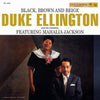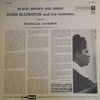



Duke Ellington & His Orchestra feat. Mahalia Jackson - Black, Brown And Beige (2LP, Mono)
Duke Ellington, piano [click here to see more vinyl featuring Duke Ellington]
Cat Anderson, Harold Baker, Clark Terry (trumpets), Ray Nance (trumpet & violin), Quentin Jackson, John Sanders, Britt Woodman (trombones), Harry Carney (baritone saxophone), Paul Gonsalves (tenor saxophone), Bill Graham (alto saxophone), Jimmy Hamilton (clarinet), Russell Procope (clarinet & alto saxophone), Jimmy Woode (bass), Sam Woodyard (drums), Mahalia Jackson (vocals)
2 LPs, gatefold sleeve
Original analog Master tape : YES
Heavy Press : 180g
Record color : black
Speed : 33 RPM
Size : 12'’
Mono
Studio
Record Press : unspecified
Label : Pure Pleasure
Original Label : Columbia
Recorded February 4–5 and 11-12 of 1958.
Produced by Irving Townsend
Remastered by Ray Staff at Air Mastering, Lyndhurst Hall, London
Originally released in 1958
Reissued in 2016
Tracks:
Side A :
2. Part 11
3. Part 111 (aka Light)
Side B :
2. Part V (aka Come Sunday)
3. Part V1 (23rd Psalm)
Side C :
2. Blues In Orbit (aka Tender)(alt. take)
3. Part 1 (alt. take)
4. Part 11 (alt. take)
5. Part 111 (aka Light) (alt. take)
Side D :
2. Part V (aka Come Sunday)(alt. take)
3. Part V1 (23rd Psalm)(alt. take)
4. Studio Conversation (Mahalia swears)
5. Come Sunday (a capella)
Reviews:
« Duke Ellington originally wrote the 50-minute Black, Brown and Beige in 1943 for a Carnegie Hall concert, where critics dismissed it as overreaching for a jazz composer. Over the next 15 years, he periodically resurrected it for performances of excerpts or, as in the case of his 1958 Columbia album, transmuting it into what was essentially a new work. Columbia's Black, Brown and Beige was one of the most extraordinary products of Ellington's second stay with the label, growing out of his 1956 Newport triumph, and it was received somewhat more readily than the original 1943 "Black, Brown and Beige." The main problem for those who knew the piece and its history lay in the absence of Johnny Hodges, who was hardly ever with the Ellington band during 1958, and on whose talents "Come Sunday," the centerpiece of the original work and even more the core of the revamped Black, Brown and Beige, was built. Instead, Mahalia Jackson sings a version of "Come Sunday" that is, if anything, equally affecting, backed by the orchestra led by Ray Nance's violin. The result on the original album was a piece that started off in big band-style blues and led to one of Ellington's most moving, wrenching pieces of work, and music that, had it been better known, might also have done more to raise people's consciousness about Civil Rights than 100 folk songs of the period. » AllMusic Review by Bruce Eder
Ratings :
AllMusic : 4.5 / 5 , Discogs : 4.12 / 5



